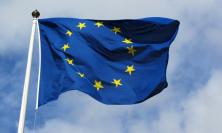How has the eurozone crisis been allowed to escalate to its current level? What does the future look like for the euro? William Mathews SJ explores the state of financial affairs in Europe and suggests that financial engineers have a number of lessons to learn from their counterparts in other fields of engineering.
‘Finance and banking once were service industries.’ (Christine Lagarde)
Despite our natural longings, the course of human history, with its black swans and innate forces of progress and decline, will never be completely controllable. Economic history has always been an irregular series of unpredictable transformations. On the eve of the Heads of State meeting in Brussels on 26 October 2011 Angela Merkel stated bluntly that Europe has not faced a crisis as deep as the present one since the Second World War. Affirming her commitment to the euro she added, underlining her own slow and cautious responses, that the problem will not be solved overnight. After insisting that the IMF audit Italy, those at the November G20 meeting, clearly overwhelmed by the problems, faded away in silence. The euro was left to save itself.
For George Soros, Europe is now at a crossroads: long-established forces of integration are in decline and those of disintegration in the political ethos are gaining ground. History is at a point ‘where you have to go forward or backward, you can’t stay where you are.’ The looming Italian debt crisis also reminds us that time is not on our side. The collapse of the euro would, for Soros, lead to a global disaster.
Conceived at Maastricht and born between 1999 and 2002, the euro is a child of its time, framed by the earlier, contagious ethos of the deregulation of finance from political control. Initiated by Reagan and Thatcher, and perfected by Alan Greenspan, this school of thought was convinced that a free global market economy would make the world a much better and prosperous place for all. What resulted over time was a dysfunctional shift in power relations with the financial world gaining unprecedented control over the political and the real economy.
Perhaps too soon the euro found itself trading in a global economy flush with liquidity as vast quantities of cheap Chinese and other Asian money came on the US market and of German and French on the European. Discarding any attempt to use it to make the world a better place, the financiers developed a manic addiction to personal profit and a matched complacency about matters of regulation and stability. The illness raged until it was momentarily stopped dead in its tracks by the Lehman’s debacle. A vast, unknown network of interbank lending froze, causing enormous hardships in the real economy where the circulation of money is as important for its health as that of blood in a human body. Every financial decision has its consequences in the life of the real economy of producers and consumers.
In denial of such consequences the financiers, despite resisting the necessary regulation and taxation of their products, have, with the assistance of the politicians, recapitalised successfully and are back making as much money as they can – not out of the production of commodities or vital infrastructure where the profit levels are low, but out of money itself, where their take is high, up to 40% of all the profits to be made. Banking and finance used to work for the government; now democratically-elected governments and their electorate work for the banks.
In this new situation, the examples of mega banks like Lehman’s, Royal Bank of Scotland and Deutsche Bank are teaching the European electorate through the 2008 crisis that they are the financial equivalent of nuclear power stations. Properly run they can produce immense power and wealth for the community; carelessly run they can cause great damage to its health. Iceland and Ireland have discovered that their national banks, through reckless foreign borrowing, have bankrupted their otherwise healthy national economies. Their unfortunate taxpayers now find themselves condemned unjustly to paying off horrendous budget deficits and living with a punishing debt-to-GDP ratio for the next twenty years. Alternatively, the banks of nations such as Germany and France can carelessly fund unwise commercial ventures or unsustainable life styles in countries such as Iceland or Greece to the point where it becomes impossible for the accumulated debt to be repaid. This debt exposure then becomes a liability for the lending banks who then seek retributive justice for a problem partially of their own making.
Because politicians and financial engineers have been oblivious to the lessons of lowlier, real-world engineers, we are now suffering from the consequences of their carelessness. You never design an air traffic control system or a nuclear power station without the highest level of built-in safety features. To ignore those features and cause public harm could result in prosecution. Yet Andrew Haldane, Executive Director of Financial Stability at the Bank of England, has no expectations that his dream of a day when global regulators will have online access to a financial ‘heat map’ of stresses in the entire global financial system will ever be realised. With almost no civil or criminal law to protect them, taxpayers now find themselves forced to pay for the irresponsible behaviour of the financiers over whom they have absolutely no control.
Within this new finance framework, central banks play an exceptional role and none more so than the European Central Bank (ECB). Currently, for European governments and their financial system, ‘All roads lead to Frankfurt,’ and many speculate that it might be the entity that makes or breaks the euro. Unique as it is among banks in the world, many are critical of its strange and in places faulty design:
- The mandate of the ECB to control inflation and price stability to the neglect of stimulating growth is unbalanced. In this it is much too closely influenced by the Bundesbank. Broader horizons and competences are needed for Europe as a whole.
- Unlike central banks of other major currencies, the ECB still does not accept the role of the bank of last resort, passing the book for political reasons to the inadequately funded and unnecessary European Financial and Stability Fund. As Europe’s debt-to-GDP ratio is much lower than that of the US, the ECB could in principle for a finite number of years buy bonds for Europe at very low interest rates and solve the entire problem.
- Its central dogma under its former president, Jean-Claude Trichet (although disputed almost everywhere else) that no bank can fail has caused enormous hardship to taxpayers.
- Its current negative attitude towards quantitative easing in the midst of a European recession is an indication of a zone of ignorance at the heart of our understanding of what money might be.
- If, generally, governments are out of their depth in dealing with the global financial system, the ECB is out of its depth when it comes to understanding and dealing with the complex European political worlds and their financial systems, which it serves.
Economically the rigid euro emphasis on ‘one solution fits all regardless’ when it comes to basic parameters such as exchange rates can be destructive. It can result in an amplification of both the inherent imbalances and the different phased relations of the economies in the eurozone. Currently this is working massively in favour of Germany, for whom the exchange rate is effectively low, and against the periphery for whom it is effectively high. As a result, in a manner similar to the dangerous relation between China and America, Germany is getting rich by exporting commodities and lending money and much of the rest of Europe is getting into debt. In the absence of some redistributive agency in the zone this most dangerous imbalance will have disastrous long-term consequences and is not sustainable.
More broadly the media coverage is also bringing to light a deep question about the set of political relations that surround the ECB. On the one hand there is the European Parliament and its president, the European Commission and its president, the Heads of State of the 27 nations and their national parliaments; on the other hand there is the President of the ECB, Sarkozy, Merkel and the Bundesbank. Sooner rather than later the decision-making role of Merkel and the Frankfurt Group in the present situation needs to end. Given the inability of the parties involved to deal directly and promptly with the problems the recent involvement of the more detached and experienced IMF is to be welcomed.
Like all things human the euro has to struggle with its excessive political complexity, design oversights and the dysfunctional financial world in which it was born. The latter’s pursuit of its core value of the maximisation of profit rather than of the quality of life is one of its major problems. As we cannot do away with financial engineering, the challenging question arises: what alternatives to the present conception of it need to be explored?
Other branches of engineering are concerned with building up infrastructure, ideally right across the board for the globe’s 7 billion inhabitants – parents with children as well as ageing parents of their own. Broadly, such infrastructure will include housing, agriculture, roads, bridges, transport systems, education and health systems, communication and entertainment. The goal, all along the line, is to produce worthwhile, necessary and useful products and services to match the genuine needs of the human population. Cumulatively, the concern is with the human need for some quality of life stretching across the generations. Innovations in science and technology constantly transform the processes and the possibilities of production.
Although the goal of finance is not the duplication of any of those activities or products, it is related to all of them in that through funding it establishes (or not) the financial conditions of their possibility (or not) within the prevailing system. When it serves the community it can enable a valuable quality of life; when it serves itself, ultimately, as we have discovered in Europe, recession and massive unemployment follows. Care is withdrawn from the most vulnerable members of society; the creative potentials of many rot on the vine: those with needs suffer, as does the quality of life.
By analogy with other types of engineering, an alternative goal of financial engineering can be defined as the enabling and production, within the limits of the natural and human resources available, of the best attainable emergent standard of living. Specifically it will be for a geographical region – a city, a province, nation or continent – but ultimately for the global population. In order to do this it must be informed and guided by a system and scale of properly human values: vital, social, cultural, personal and religious, through which a vital link with society at large will be established.
As well as the goal and its values, there are also the method and tools of production to be considered. As the need for innovations arise, other forms of engineering update from hand tools to robots. Mervyn King, the Governor of the Bank of England, pinpoints a parallel financial need when he says that of all the methods of banking on offer, the one we have chosen – fractional reserve banking – is the worst. This, and the annoyance that the mention of quantitative easing generates, point to the fact that there is a generally unrecognised flaw in our current design of the basic financial tool: money. That tool has to be conceived more in living, organic terms, capable of creating and expanding new forms of living. Like the stem cells in our bodies it needs also to be capable of healing rather than worsening economic wounds and responding instantly to natural disasters such as current the famine in the horn of Africa. Financial engineering drastically needs creative leadership to rescue it from its fatal inadequacies but as things stand, it does not seem as if it will come soon. Hopefully Europe will bite the bullet and address the real problems so that some slight progress will have been made before 28 July 2014, otherwise it may find itself marking the 100th anniversary of the outbreak of World War I as a divided continent once again.
William Mathews SJ is Emeritus Associate Professor of Philosophy at the Milltown Institute, Dublin.
References
- Chomsky, Noam, ‘Noam Chomsky on the State-Corporate Complex’, delivered at Hart House Great Hall, University of Toronto, 7 April 2011.
- Engelen, Ewald et al, After the Great Complacence: Financial Crisis and the Politics of Reform (Oxford University Press, 2011)
- Ferguson, Charles (dir.) Inside Job, (Sony Pictures Classics, 2010)
- Hartford, Tim, Adapt: Why Success Always Starts with Failure (Little, Brown, 2011)
- Marsh, David, The Euro: The Battle for the New Global Currency (Yale University Press, 2011)
- Mathews SJ, William, ‘Finance Ethics’, The Lonergan Review (Seton Hall University, New Jersey), Vol II, No 1, Spring 2010.
More on the eurozone crisis on Thinking Faith:
![]() ‘The UK and the Eurozone‘ by Frank Turner SJ
‘The UK and the Eurozone‘ by Frank Turner SJ
![]() ‘The United Kingdom?‘ by Tony Carroll
‘The United Kingdom?‘ by Tony Carroll






